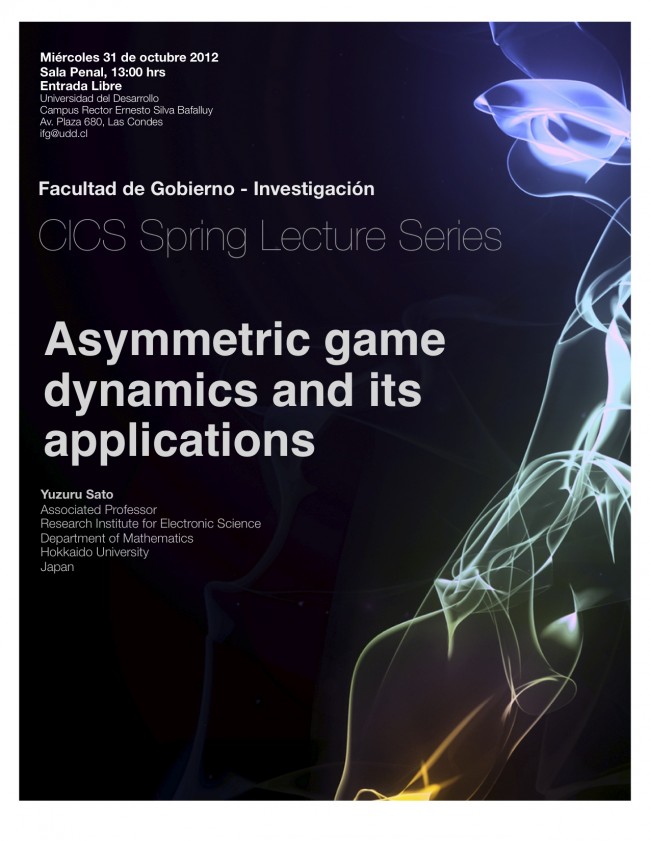“Asymmetric game dynamics and its applications”. Yuzuru Sato’s lecture
Monday, 8 October, 2012 | CALENDAR, EVENTS, NEWS
Yuzuru Sato obtained a Ph.D. in nonlinear physics and complex systems from the University of Tokyo in 2000. He received postdoctoral fellowships from JSPS (2000-2001), RIKEN (2001-2002), and Santa Fe Institute (2002-2006). Since the year 2006, he is an associate professor at RIES Complex Systems Group / Department of Mathematics at Hokkaido university. His research is focused on problems in the field of application of nonlinear dynamical systems and complex systems.
Lecture: “Asymmetric game dynamics and its applications”
When: wednesday, 31th October
Where: Sala Penal, Universidad del Desarrollo, campus Rector Ernesto Silva Bafalluy, Av. La Plaza 680, Las Condes.
Language: English
Abstract: Asymmetric game dynamics is a class of ODEs that describe learning in games, starting from microscopic stochastic learning [1]. Although individual players interact with their environment in a purely self-interested way, macroscopic behavior can be interpreted as game dynamics in this context. Applications to several explicit game interactions exhibits a diversity of nonlinear dynamical behaviors [2]. In this talk, we discuss several extensions of asymmetric game dynamics in terms of learning in game [3].
References:
[1] P.D. Taylor and L.B. Jonker, Math. Biosci., 40, p145-156, (1978); J. Hofbauer and K. Sigmund, “Evolutionary Games and Population Dynamics,” Cambridge University Press, (1988); J. Hofbauer, J. Math. Biol., 34, p675-688, (1996); D. Fudenberg and D. K. Levine, “Theory of Learning in Games,” MIT Press, (1998).
[2] Y. Sato, E. Akiyama and J. D. Farmer, PNAS, 99, p4748-4751, (2002); Y. Sato and J. P. Crutchfield, Physical Review, E 67, p015206(R), (2003); Y. Sato, E. Akiyama and J. P. Crutchfield, Physica, D 210, p21-57, (2005). [3] Y. Sato and D. Farmer, in preparation; Y. Sato and N. Ay, Hokkaido University Preprint Series, 819, Hokkaido University, submitted; Y. Sato and F. Atay, in preparation.Link: http://www.math.sci.hokudai.ac.jp/~ysato/en/index.html
Yuzuru Sato obtuvo un doctorado en Física no linear y Sistemas Complejos de la Universidad de Tokyio el 2000 y recibió sus becas postdoctorales de JSPS (2000-2001), RIKEN (2001-2002) y del Instituto de Santa Fe. (2002-2006). Desde el año 2006 es profesor asociado de RIES Complex System Group / Departamento de Matemáticas en la Universidad de Hokkaido, Japón. Su investigación se centra en problemas del campo de la aplicación de sistemas dinámicos no lineales y sistemas complejos.
CHARLA “Asymmetric game dynamics and its applications”
Cuándo: miércoles 31 de octubre 13:00 hrs.
Dónde: Sala Penal, Universidad del Desarrollo, campus Rector Ernesto Silva Bafalluy, Av. La Plaza 680, Las Condes.
Idioma: Inglés.
Abstract: Asymmetric game dynamics is a class of ODEs that describe learning in games, starting from microscopic stochastic learning [1]. Although individual players interact with their environment in a purely self-interested way, macroscopic behavior can be interpreted as game dynamics in this context. Applications to several explicit game interactions exhibits a diversity of nonlinear dynamical behaviors [2]. In this talk, we discuss several extensions of asymmetric game dynamics in terms of learning in game [3].
References:
[1] P.D. Taylor and L.B. Jonker, Math. Biosci., 40, p145-156, (1978); J. Hofbauer and K. Sigmund, “Evolutionary Games and Population Dynamics,” Cambridge University Press, (1988); J. Hofbauer, J. Math. Biol., 34, p675-688, (1996); D. Fudenberg and D. K. Levine, “Theory of Learning in Games,” MIT Press, (1998).
[2] Y. Sato, E. Akiyama and J. D. Farmer, PNAS, 99, p4748-4751, (2002); Y. Sato and J. P. Crutchfield, Physical Review, E 67, p015206(R), (2003); Y. Sato, E. Akiyama and J. P. Crutchfield, Physica, D 210, p21-57, (2005). [3] Y. Sato and D. Farmer, in preparation; Y. Sato and N. Ay, Hokkaido University Preprint Series, 819, Hokkaido University, submitted; Y. Sato and F. Atay, in preparation.Link: http://www.math.sci.hokudai.ac.jp/~ysato/en/index.html


